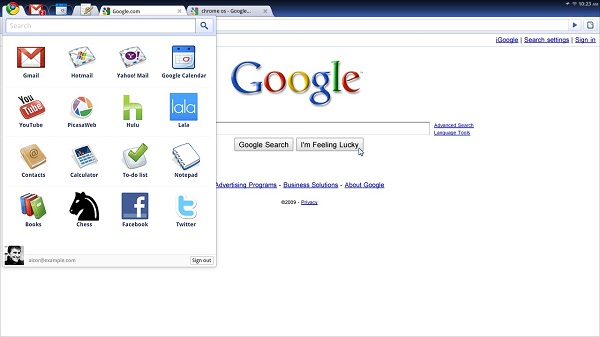Now that the tech world has had some time to look at ChromeOS, Google’s new stab at an operating system, there is a lot of skepticism about the worth and viability of the move.
While Google trumpeted the launch as the future of the OS, a lot of people are a lot less sure. Some, like Gmail creator Paul Buchheit , think it will be dead by the end of next year, and will end up simply merged into Android. Others, like GNU founder Richard Stallman, are worried that a cloud OS will put users at risk. Some tech blogs seem to think the whole thing is a waste of time.
All are fair complaints. But what many are missing is that this is Google’s first real stab at redefining a non-desktop operating system. So whether or not it’s a smashing success is one thing. But it’s also worth considering what’s behind the move and what the ramifications are for computing in general.
Why the Desktop OS = Old School Thinking
https://www.youtube.com/watch?v=0QRO3gKj3qw
The rise of mobile technology, wi-fi, and mobile broadband has meant that the concept of being strapped to your desk has ceased to exist. Additionally, with services like Dropbox, Google Docs, Evernote and a host of others, the idea of your data being tied to a device is also waning. Things live in the cloud.
At the same time, the operating system itself has stayed desktop-centric. The maintenance of an OS – in terms of security, app updates, OS updates, file management – all happens locally on individual computers. To keep this up to date not only requires a slew of services running in the background, consuming resources, but also just takes up a lot of time. One does, after all, have to wait for all this to happen.
As Google’s Sundar Princhal pointed out at the ChromeOS event recently, this is reflective of the fact that operating systems today are built as if the web doesn’t exist. They then put web features on top. Even a cursory look at the file system on Windows or OS X confirms this idea. In modern operating systems, the web is an afterthought, tacked on at the end.
When you think about the situation in which the OS constantly has to be updated, upgraded and tweaked over time, it’s a bit like asking to update the electrical wiring in your house every time the way electricity is generated changes. That, of course, would be silly. All you want to do is turn on your kettle. Who cares how it happens? (As long as it’s environmentally-friendly, of course.) What makes far more sense is to simply have wires that conduct electricity regardless of where it comes from, how it’s produced or how much of you need.
With the Cloud, Computers ‘Just Work’
With a cloud OS and cloud apps, changes in security, updates to apps – even massive changes in infrastructure – all happen seamlessly somewhere else. What this means is that you simply log in to an updated app and there it is. No downloading patches, no virus definition updates, no confusing calls from your relatives about how they don’t get what ‘I need to upgrade Flash’ means. With a cloud-based operating system, the sense of a computer as a mystifying miasma of pop-up messages and notifications disappears. As long as you have a web connection, things will work, because apps become services rather than products: things that are run and updated for you over time so you don’t have to worry about it.
Think about how utterly strange it is that your average tech user has to update to the latest version of a plugin, browser, or operating system just to get something simple like a video to work. Can you imagine the same situating existing with TV? “Oh, I’m sorry, to watch this show, you have to open up your TV, tweak a few things, then plug in everything again.” That’s how computers work today.
ChromeOS is a fundamental rethink not just of ‘an operating system’, but how we access technology. Rather than device-centric, the device simply becomes a window to a set of services that exist anywhere, at anytime. Apps and data don’t, in an obvious way, exist anywhere. They simply are.
What’s more, as broadband speeds increase over time, a cloud OS will allow you to take advantage of the massive differences in computing power between one lone system and hundreds of them. Rather than a quad-core processor, with a fast-enough pipe, you could crunch 1080p video on a hundred of Google’s servers instead one computer of your own, taking mere minutes instead of hours.
The purpose of a cloud OS is twofold: a) it’s to turn the computer into a transparent machine that simply works and connects you with services and apps in the cloud; b) to aggregate the power of the cloud so that computing power becomes a question of how many servers run your apps, not how much you spent on a box in your home.
Whether It Succeeds or Fails, ChromeOS is a sign of the Future
Are there problems with ChromeOS? Absolutely. There are real privacy concerns, worries about data costs, skepticism about the netbooks themselves and a host of other issues. And in all honesty, in a world of iOS and Android, it’s hard to see ChromeOS taking off, especially when ChromeOS apps still run in a regular Chrome browser.
But ChromeOS, even if it fails, is still a sign of something bigger: the movement of our technology experience away from purchasing computer power and storage and instead to our buying into services in the cloud.
Whether or not this is a universally good thing remains to be seen. But there are clear benefits of the cloud for usability, ease, accessibility and power. And it’s time to start reckoning with that fact.



GIPHY App Key not set. Please check settings
21 Comments